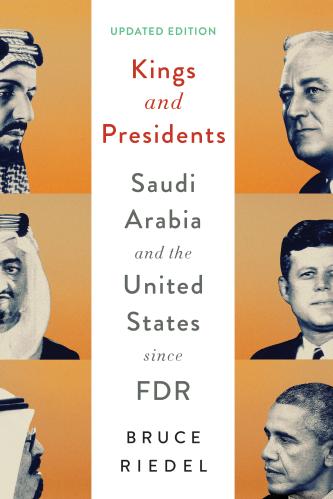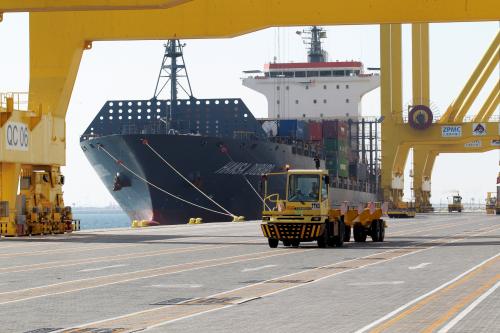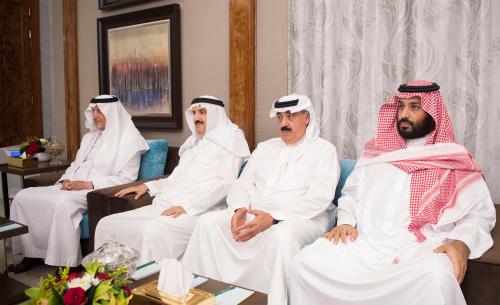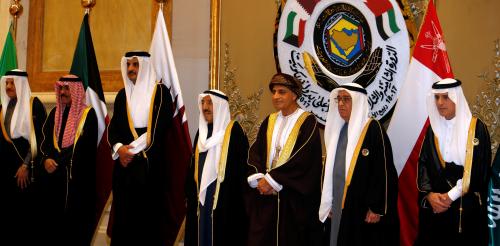Content from the Brookings Doha Center is now archived. In September 2021, after 14 years of impactful partnership, Brookings and the Brookings Doha Center announced that they were ending their affiliation. The Brookings Doha Center is now the Middle East Council on Global Affairs, a separate public policy institution based in Qatar.
In recent months, Saudi Arabia’s increasingly assertive foreign policy—from the ill-conceived blockade on Qatar to the worsening quagmire in Yemen and beyond—has seemed like repeated shots to its own foot. Particularly in the wake of the military defeat of the Islamic State’s self-proclaimed caliphate and concomitant Iranian advances in territories freed from the terror group, Riyadh lacks a clear, achievable strategy vis-à-vis its regional rival Iran.
The December 5 Gulf Cooperation Council (GCC) Summit (which all member states—Saudi Arabia, Oman, the United Arab Emirates, Qatar, Bahrain, and Kuwait—attended) presented an important occasion to revitalize the Council, beleaguered ever since the blockade of Qatar began in June. It was also a chance to reverse the impression of irreversible dysfunctionality, including particularly vis-à-vis Iran. But the meeting failed on both counts: At the last minute, Saudi Arabia and the United Arab Emirates downgraded the officials that they sent; on the same day, the two created a Joint Cooperation Committee, further undermining the GCC as the Arabian Peninsula’s main security forum by creating a kind of mini-GCC
The day before, the GCC’s foreign ministers—including those of Saudi Arabia and Qatar—convened a preliminary meeting, which ended inconclusively. This did not bode well for the summit the next day, and rather unsurprisingly, the summit lasted for a mere two hours, rather than the scheduled two days.
Add to this the same-day news that U.S. President Donald Trump will move the U.S. embassy in Israel from Tel Aviv to Jerusalem, which heightens the sense of alienation that many in the Middle East feel regarding Riyadh’s anti-Iran front forged with the Trump White House and the Netanyahu government. President Recep Tayyip Erdoğan of Turkey has immediately reacted by stating that “Jerusalem is a red line for Muslims,” adding that Ankara would convene a summit of the Organization of Islamic Cooperation (OIC) in Istanbul within the next week in case the United States actually moves forward with such a plan. While the Palestinian cause has always triggered populist rhetoric from the regional states’ leaders from Ankara all the way to Tehran, it enjoys broad sympathies throughout the region, however somehow attenuated by the rise of nationalist sentiments there.
Pile on the fact that—again on the same day—Saad Hariri withdrew his resignation as Lebanese prime minister and his ruling coalition (which includes Iranian-sponsored Hezbollah) pledged to adhere to the policy of disassociation. Hezbollah’s active military involvement to protect the regime of Bashar al-Assad was a clear violation thereof. On the one hand, Riyadh might rejoice that a flare-up in regional conflicts, likely sooner rather than later, will prompt Hezbollah to re-engaging in extraterritorial operations, thus again violating its commitment to disassociation. Such a scenario could trigger a national crisis in Lebanon, which might produce new, insurmountable pressure on Hezbollah. On the other hand, Riyadh hasn’t successfully pushed back against Hezbollah’s influence over Lebanese politics. Further to that, Hariri’s reversal may exacerbate the feeling that his resignation, announced while he was in Saudi Arabia a month ago, was merely a result of heavy Saudi pressure.
Against this backdrop, U.S. representatives will attend the Manama Dialogue this weekend in the Bahraini capital—a regional security summit that typically features one-sided discussions on Iran, since in the past two years at least, no official or semi-official participants from Iran were granted visas. This year, there is seemingly no participation from Qatar either. The United States should send a strongly-worded message about working to reestablish the unity of the GCC.
Riyadh’s inability to bring an end to the self-imposed conflicts over Yemen and Qatar, as well as push Lebanon away from Iran, reflects a strategic ineptitude to devise a wise and workable containment policy towards an expansive Iran. Instead of coalescing around an anti-Iran front that lacks strategic vision and is politically problematic (the Muhammed bin Salman-Trump-Netanyahu axis is met with suspicion in many quarters), the Saudis should aim to save the GCC from total irrelevance. They should also coordinate regional efforts with the United States and the EU, who themselves need to devise a common transatlantic approach towards Iran. All this would necessitate that Riyadh step down from its maximalist positions, and accept Qatari sovereignty and Iran as a legitimate regional player whose overreach needs to be contained but whose influence cannot be eradicated.
For now, the smiling third party remains Tehran, whose leaders might be reciting Macbeth as they watch their regional rival fumble: “a poor player / That struts and frets his hour upon the stage / And then is heard no more: it is a tale / Told by an idiot, full of sound and fury, / Signifying nothing.”
The Brookings Institution is committed to quality, independence, and impact.
We are supported by a diverse array of funders. In line with our values and policies, each Brookings publication represents the sole views of its author(s).








Commentary
Facing big political challenges, this week’s Gulf Cooperation Council meeting fell flat
December 6, 2017